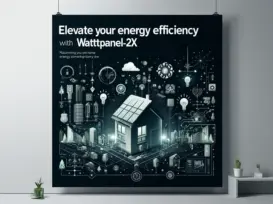Grus Home Energy - energy efficient home improvement
Maximize Your Home's Energy Efficiency with Smart Improvement Strategies
Maximize Your Home’s Energy Efficiency with Smart Improvement Strategies
Energy efficiency in the home not only contributes to a healthier environment but also to substantial savings on utility bills. As we become more conscious of our energy consumption and the impact it has on our planet, homeowners are increasingly looking for ways to make their living spaces more energy-efficient. Implementing smart home improvement strategies can significantly reduce your home’s energy usage, save money, and increase your property’s value.
One of the most effective ways to enhance your home’s energy efficiency is through insulation. Proper insulation in walls, attics, and floors minimizes heat transfer, keeping your home warm during the winter and cool during the summer. This reduces the need for heating and cooling, which are some of the biggest energy consumers in a household. Consider materials like spray foam, rigid foam boards, or blown-in cellulose, which have high R-values — a measure of insulation’s ability to resist heat flow.
Upgrading to energy-efficient windows is another impactful home improvement. Double or triple-glazed windows with low-emissivity (Low-E) coatings can drastically reduce energy loss. These coatings reflect infrared light, keeping heat inside during the winter and outside during the summer. Additionally, sealing gaps and cracks around windows and doors with caulk or weatherstripping can prevent unwanted air leakage.
The heart of many homes is the HVAC (heating, ventilation, and air conditioning) system, and ensuring it is running efficiently is key to reducing energy consumption. An outdated HVAC system can be a significant energy drain. Consider replacing it with an Energy Star-rated system, which uses less energy than standard models. Regular maintenance, including replacing filters, cleaning ducts, and checking for leaks, can also improve your system’s efficiency.
Another area where considerable energy savings can be achieved is lighting. Swapping out incandescent bulbs for LED lights can lead to a remarkable decrease in energy use. LEDs are not only more efficient but also last much longer than traditional bulbs, reducing the need for frequent replacements. Smart lighting systems that allow you to control lights remotely or program them to switch off automatically can also aid in reducing consumption.
Appliances account for a significant portion of energy usage in the home. When it’s time to replace them, opt for Energy Star-certified appliances, which are more efficient than their conventional counterparts. This applies to refrigerators, dishwashers, washing machines, dryers, and water heaters. Additionally, consider installing a programmable thermostat that adjusts the temperature based on your schedule, which can lead to substantial energy savings.
Water heating is another area where energy efficiency can be improved. Traditional tank water heaters can be replaced with tankless or on-demand water heaters, which only heat water as it’s needed. This eliminates the energy wasted in keeping a large tank of water hot at all times. Additionally, insulating hot water pipes and using low-flow fixtures in showers and sinks can further reduce energy consumption.
Lastly, renewable energy systems like solar panels or small wind turbines can be an excellent investment for long-term savings and sustainability. These systems allow you to generate your own clean energy, potentially reducing your reliance on the grid and lowering your energy bills. While the initial investment can be significant, tax incentives and decreasing costs of technology can make renewable energy systems more accessible.
Implementing these energy-efficient home improvement strategies can make a significant difference in your energy consumption and reduce your environmental footprint. Each step you take brings you closer to a greener, more sustainable, and cost-effective home. Start with an energy audit to identify the most effective improvements for your specific situation, and prioritize changes that offer the greatest benefits in terms of energy savings and return on investment.
©2025 All Rights Reserved. Grus IoT Co.,Ltd.
